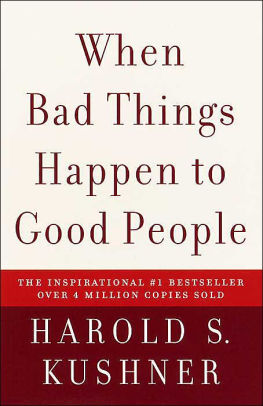Originally published September 18, 2018
Rabbi Harold S. Kushner, currently published by Anchor Books. available for less than $10.00
One of the things that one must do when preparing a book proposal to market your masterpiece to the publishing world is find comparables in the market. What’s out there, what does it say, and why is your work different. In that process, I read Rabbi Kushner’s best seller, When Bad Things Happen to Good People. The title has sold millions, and although I don’t aspire to such heights, I do feel there is much in his work I would agree with, and a few things I don’t.
I can understand why the Rabbi’s book has reached so many people. He builds on the interpretation that there are random events in the world, events that are caused by other people’s freedom of action, and events that we are unprepared for. He strongly believes that we should not be Job’s visitors and try to comfort those who are suffering with some unfounded bit of wisdom about how this will make the victim stronger, or God has a message, or some other bit that rarely helps. Sometimes, such ministrations make the whole matter much worse. In this I agree, at least in part.
Kushner also devotes much of his book to the idea that we must step away from the blame game. Everything that happens in our lives is not punishment by some super-spy deity that wants to ensure we pay for every infraction we have ever committed, whether the reasons are known or not. If I had to decide, one of the most critical ideas he presents in this book is to stop the blame. The universe does not turn on your every decision and sometimes you are not guilty of initiating some horrible outcome. Sometimes you are. Those instances should, however, be clear and correctable. Don’t blame God for lung cancer if you insist on smoking.
Although this thought is not discussed in his book, I believe it gave me some insight to some of the issues we are facing in society now. We are told, in scripture, to love one another as we love ourselves. On the flip side, if we are always blaming ourselves, if we believe that every bad thing that happens is punishment for something we, or someone else, did—then we must assume that folks that are in deep poverty, sick, or otherwise challenged did something to deserve it. And that’s what we do. If she had dressed differently, if he had not let people know he was gay, if he had prayed harder, if she had given more, if they had better control over their children, and a thousand other reasons why “that thing” happened to them and not us. If we do manage to escape the consequences of a catastrophe, we are somehow especially blessed and protected by God. I must ask—does that make you better than me? If I die in a plane crash and you don’t, are you somehow more holy?
This was the problem with Job’s visitors (I can’t come to a place I can call them comforters), they could not allow the world to be a random place where God’s justice and power did not reach into every detail of every life. To avoid the thought of calamity in their own lives, they had to find reason to blame Job for his.
To return to Kushner’s book, from a pastoral perspective, he does a masterful job of teaching people to let go of the anger. Anger at themselves, at others, at God, and to find some way to move forward. His position is that God is not in the event, He is the one that helps us find a way to deal with the consequences. He is there to help us convert the bad into something the will inform and support us in the future. The Rabbi is not a stranger to calamity. He wrote the book to help others understand the journey he and his wife experienced as they watched their first born suffer from an incurable disease that killed him at age fourteen. He knows what it means to ask why.
Here are some excerpts I considered very much to the point:
“If we want to be able to pick up the pieces of our lives and go on living, we have to get over the irrational feeling that every misfortune is our fault, the direct result of our mistakes or misbehavior. We are really not that powerful. Not everything that happens in the world is our doing.”
One of the hardest lessons of children who have been abused in any way is, “It’s not my fault.” I would add, we need to learn the same of others. We can assess responsibility and still avoid being judgmental of other people’s choices. Learn the difference.
“If we believe in God, but we do not hold God responsible for life’s tragedies, if we believe that God wants justice and fairness but cannot always arrange for them, what are we doing when we pray to God for a favorable outcome to a crisis in our life?”
The Rabbi is very much against the “grocery list” prayer and chooses to teach an approach where we seek the strength to move through the disaster, where we find ways to accept the good or the bad outcome, without blaming persons or forces that are not responsible. If they are responsible, is it a situation that must be dealt with, was it an accident, can you move from the hurt, and even hatred? How do you release the anger so that you do not destroy yourself in the process? That is the space where Kushner feels God lives. The sum of his work teaches that suffering finds its meaning not in the why it happened, but in the what we do with it.
“God does not cause our misfortunes. Some are caused by bad luck, some are caused by bad people, and some are simply an inevitable consequence of our being human and being mortal, living in a world of inflexible natural laws. The painful things that happen to us are not punishments for our misbehavior, nor are they in any way part of some grand design on God’s part. Because the tragedy is not God’s will, we need not feel hurt or betrayed by God when tragedy strikes. We can turn to Him for help in overcoming it, precisely because we can tell ourselves that God is as outraged by it as we are.”
As noted, there is much here that is a part of my view. However, Redefining Job and the Conundrum of Suffering takes the reader in a slightly different direction. Rather than surrender to a belief that all is random and there is no cause, I prefer to see the universe with a sense of the quantum. Quantum physics works because predictable results occur. We do have a universe of laws. We do have probabilities that are within our purview to discover, to understand, to mitigate. To me the author of Job is trying to tell us that we are given the gifts to change the world. We do not live in a vacuum of circumstance, and we are not pursued daily by a vengeful god. Bad things happen, and they will continue to do so. The question is, what do we in response?
I like this bit that Kushner includes in his book. It is a Likrat Shabbat prayer by Rabbi Jack Riemer.
We cannot merely pray to You, O God, to end war;
for we know that You have made the world in a way
That man must find his own path to peace
Within himself and with his neighbor.
We cannot merely pray to You, O God, to end starvation;
For you have already given us the resources
With which to feed the entire world.
If we could only use them wisely.
We cannot merely pray to You, O God, to root out prejudice,
For You have already given us eyes
With which to see the good in all men
If we would only use them rightly.
We cannot merely pray to You, O God, to end despair,
For you have already given us the power
To clear away slums and to give hope
If we would only use our power justly.
We cannot merely pray to You, O God, to end disease,
For you have already given us great minds with which
To search for cures and healing.
If we would only use them constructively.
Therefore, we pray to You instead, O God,
For strength, determination, and willpower,
To do instead of just to pray,
To become instead of merely to wish.
Plan a visit with me and my hero, Job. We’ll be ready very soon.




No Comments